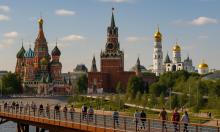Third currency war to take world back to gold standard?
The issues of foreign exchange regulation and the future of the world financial system continue to occupy free minds. Investment banker James Rickards believes that the world lives in the situation of the Third Currency War. The U.S. is exporting inflation and tying to limit protective manipulations with exchange rate of other countries, Rickards says.
The author of the book "Currency Wars: The Making of the Next Global Crisis" reminds us of a sharp rise in inflation in China during the implementation of quantitative easing programs instigated by the Fed.
The banker believes that this is a perfect weapon of a currency war, and the Fed knows it. China now imports inflation from the U.S. through the mechanism of exchange rate anchor, whereas previously it exported deflation to the U.S., BFM.ru reports referring to the writer.
The parade of devaluations of currencies of the countries seeking to maintain competitiveness in the global market has been observed for over a year. Rickards recalls that devaluation race was observed before the Great Depression in the 1920s and the economic crisis of the capitalist economy in the 1970s.
"Currency War, as a consequence of an unhealthy state of the global economy, will undoubtedly be continued in 2012. The fact is that the much-praised concept of liberalization of markets makes it impossible to maintain national markets through protectionist measures and direct subsidies of domestic producers. In times of crisis, countries simply need to save their markets, therefore the only "legitimate" measure left is currency devaluation," Elena Turzhanskaya, a senior analyst of Kalita-Finance told Bigness.ru.
"The two waves of devaluation mentioned by Rickards were accompanied by the transfer of private debt to the shoulders of the states the same way it is happening today. In addition, the depreciation of currencies before World War II was followed by an attempt to return to the gold standard. The parallels with today's situation are obvious. "
"The widespread depreciation rates we have been observing since the crisis of 2008 are pushing economists to search for a reliable asset that can become the world's reserve measure and protect the savings. Many analysts think about the possibility of returning to the gold standard. However, this is impossible, even from a physical point of view. In order to provide gold for the current GDP of the United States alone we would need 269, 525 tons of the precious metal. It is worth mentioning that to date all the nations of the world have only 30,700 tons of gold in their treasuries," Turzhanskaya said.
In addition, the increased cost of the metal leads to a corresponding increase in the cost of national currency, which will affect the country's exports, and rising prices could result in the loss of foreign markets. "If we talk about the economies whose share of world GDP is significant, the likelihood of damage is extremely high," the analyst explained.
Some analysts predicted active development of the so-called currency blocks. Much will depend on the story of the euro. The Eurozone is experiencing issues faced by other monetary unions. Rickards considers possible developments in this scenario and calls it the most optimistic.
The possibility of forming a monetary union is seen in the logic of creating a single economic space in the former Soviet Union. However, on the background of regulatory issues in the Eurozone this perspective may not seem all that promising.
The most negative scenario according to Rickards will be chaos and panic followed by a collapse of the dollar system. He writes that the scale of destruction of capital, savings and confidence as a result of currency wars and the fall of the U.S. dollar may be no less disastrous than an alien invasion. Everyone's wealth will be limited to what they can carry on their own shoulders.
The investment banker believes that the system of special drawing rights used by the IMF is inefficient and inconvenient, but the gold standard in some ways is quite flexible and can promote the recovery of the financial system.
Anatoly Miranovsky.
Subscribe to Pravda.Ru Telegram channel, Facebook, RSS!



